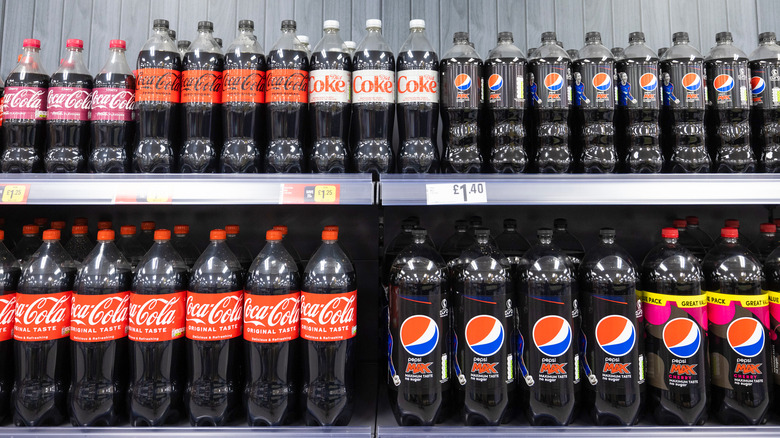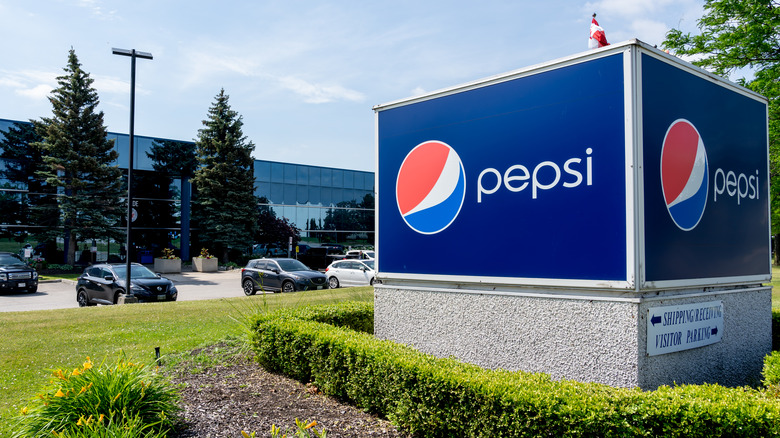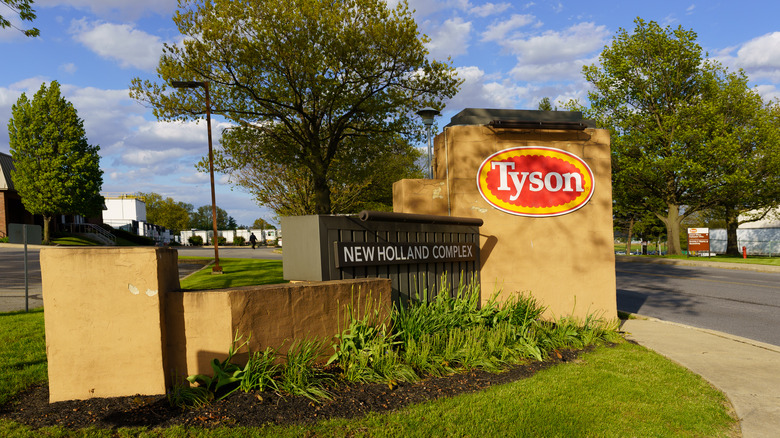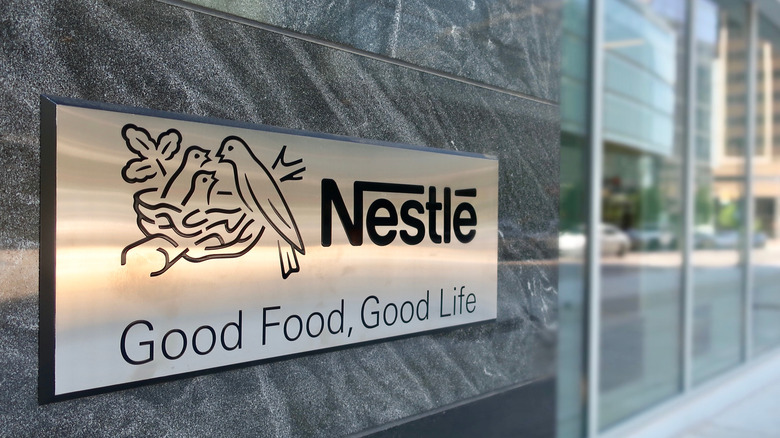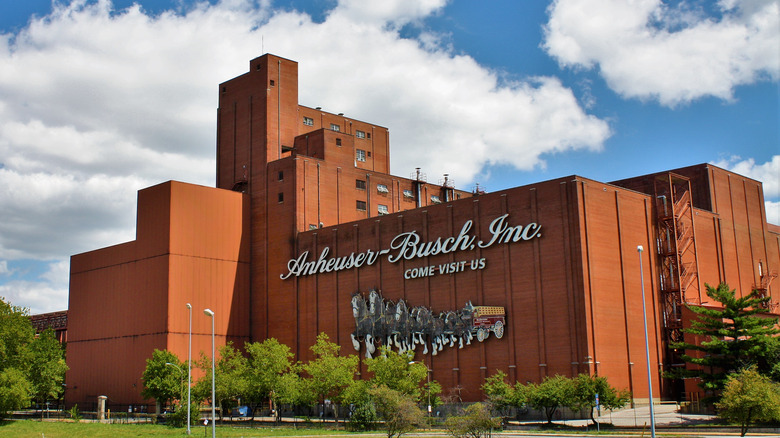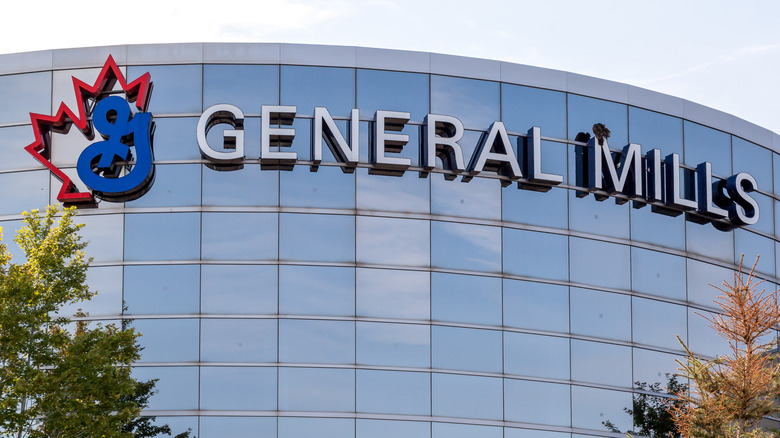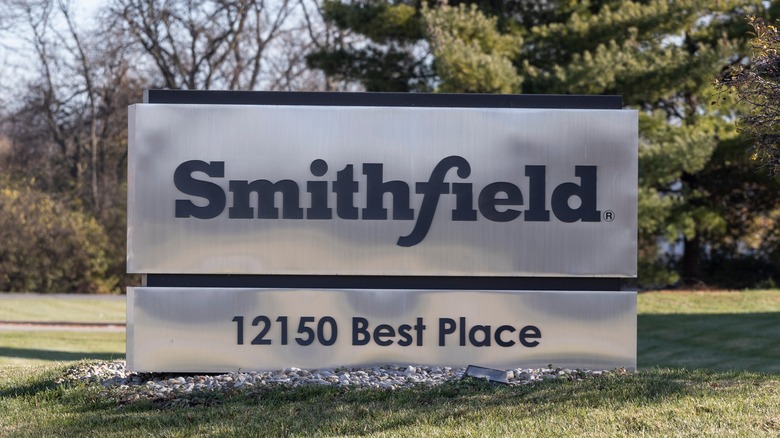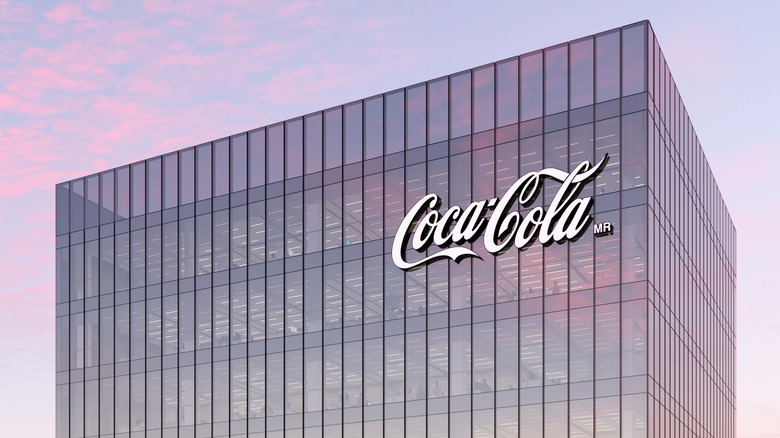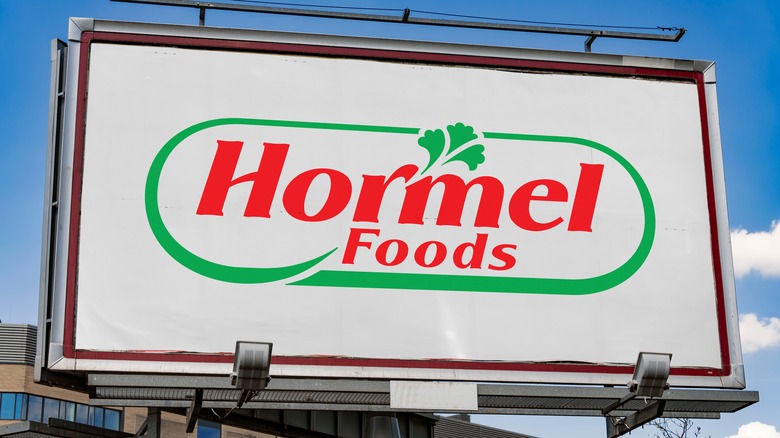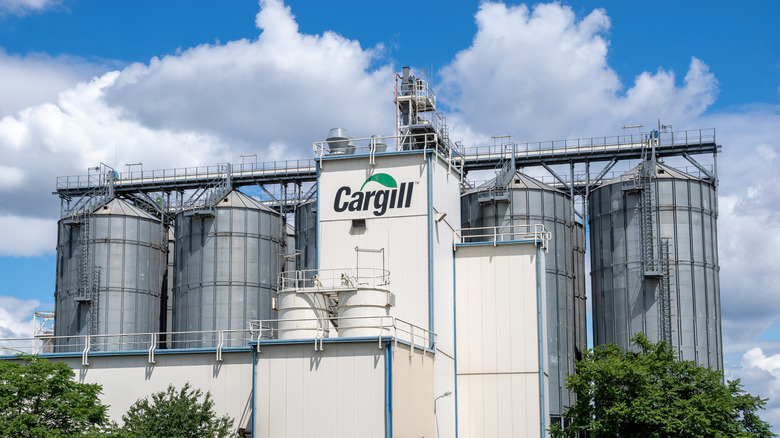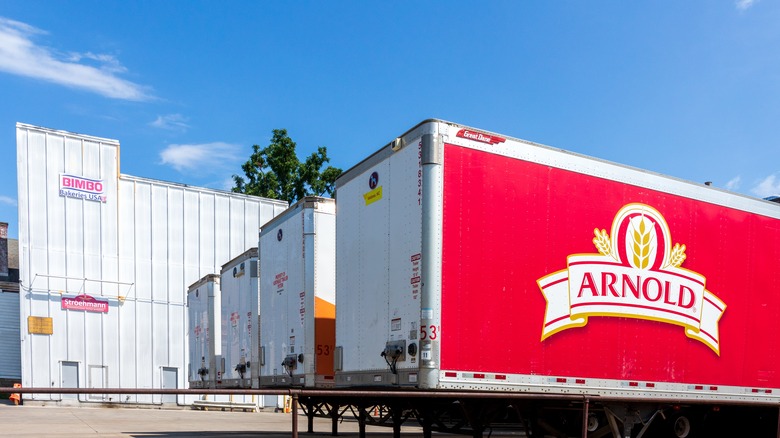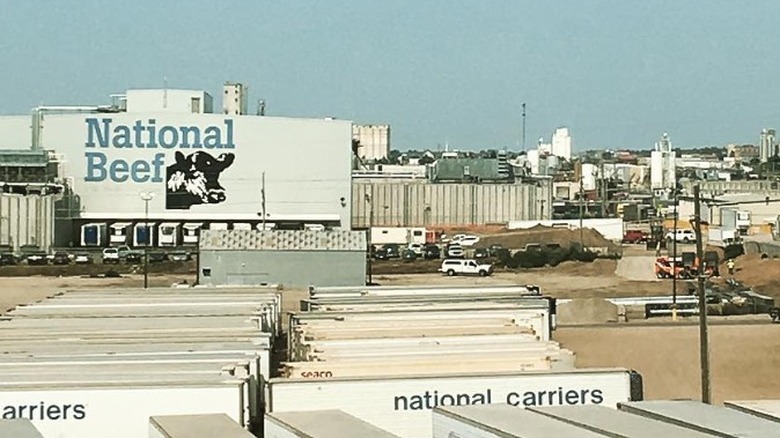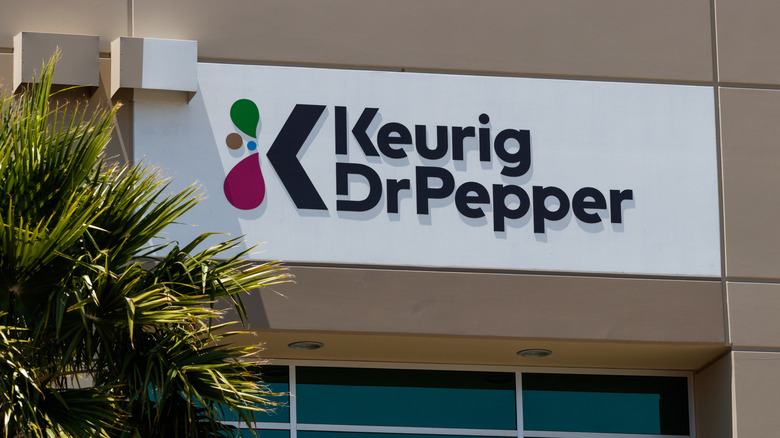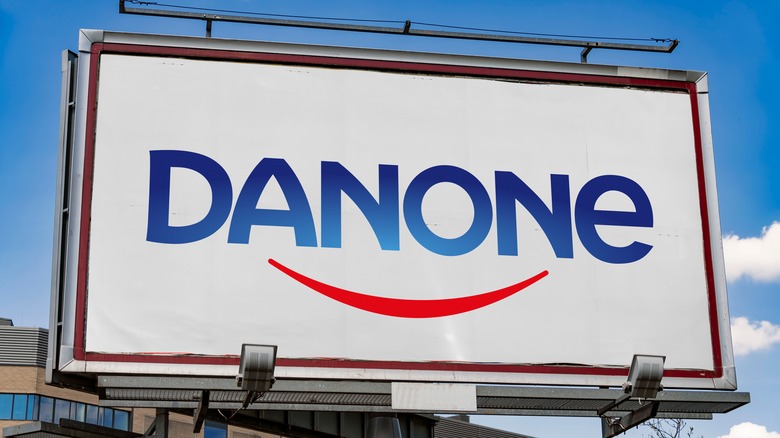Popular Food Companies That Raised Prices And Made Big Profits In 2022
Many of the top food companies in the U.S. have raised prices and made record profits in 2022. When faced with challenges like inflation, lower sales volumes, and supply chain issues, which have been common over the last few years, companies must enact new strategies to ensure they hit their goals. And while some of the most popular food companies, like Kraft Heinz and Campbell's, are losing profits, many other big names have seemingly figured out how to overcome current economic challenges, becoming more profitable than ever before.
Oxfam International found that food billionaires increased their collective net worth by 42% — and 62 new people became "food billionaires" — from 2020 to 2022 (via Phys.org). Meanwhile, food prices in 2022 were up an average of 30% from the year before (via The Guardian). Some food companies feel that people are adjusting to higher food prices just fine. However, according to an Urban Institute survey, one out of every six U.S. adults were relying on food charities at the beginning of the year. And food banks are struggling to keep up with demand with fewer donations and an increase in food prices (per The New York Times).
We looked at Food Processing's top 25 food companies to determine which corporations came out on top in 2022. While you may not recognize all the names of the profitable parent companies, you'll certainly recognize the brands they sell, many of which are staples at your supermarket and even on your grocery list.
PepsiCo
PepsiCo owns over 500 brands of food and drinks, producing everything from Doritos and Quaker Oats to Aquafina bottled water and, of course, Pepsi. According to The Wall Street Journal, between 2021 and 2022, Pepsico increased the cost of its snack foods and drinks by an average of 17%. The company reportedly says its latest price increases are all about offsetting growing costs for production.
When WSJ talked with PepsiCo's finance chief, Hugh Johnson, he called PepsiCo's products an "affordable luxury." Johnson seemed to be pleased that consumers have "stuck with" PepsiCo products despite the rising prices. Sure, chips and soda can be considered luxuries, but some of the company's products, like oatmeal and water, are not.
By the end of the third quarter of 2022, PepsiCo's revenue was at $21.97 billion, which was 9% above its earnings from 2021. And by the end of the year, they expect to increase their revenue by 12% from 2021 (via CNBC). PepsiCo's increased prices have seemingly already more than compensated for rising production prices.
Tyson Foods
Tyson Foods is responsible for roughly 20% of the chicken supply in the U.S. (via The Wall Street Journal). The company also own 33 other brands, including Jimmy Dean, Hillshire Farms, Ball Park, and Sara Lee's meat division. So, while Tyson is known for chicken, some of its other brands depend on beef and pork supplies as well.
At the end of 2021, Reuters reported that a White House analysis determined that Tyson "made record profits while actually selling less beef than before" because they had raised the price by over 35%. While drought conditions have affected the cost of beef, Tyson says it has enough livestock to continue to support its beef-related operations (via Meat+Poultry). Sales for the fourth quarter of 2022 increased by 7% over the same period in 2021 to $13.74 billion. At the same time, Tyson Foods' prices have increased 12.3% overall for the year, with an 18% increase in chicken prices and a 13.5% increase in prepared food prices. Vice president John R. Tyson explained that pork has become relatively expensive because of the global demand for it contrasted against "high domestic retail prices and the strong US dollar." According to CEO Donnie King, Tyson Foods attributes rising profits to the "continued strength in consumer demand for protein" (via TB&P). He told the press, "We're not asking customers or the consumer ultimately to pay for our inefficiencies, we're asking them to pay for inflation" (via WSJ).
Nestlé
Nestlé isn't just about chocolate and Nescafé. The company owns dozens of brands, which make products such as water, cereals, chocolate, coffee, frozen foods, dairy products, beverages, ice cream, and even pet food. You likely recognize foods from several of Nestlé's brands, like Purina, Boost, Carnation, Gerber, Lean Cuisine, Stouffer's, and KitKat.
For the first nine months of 2022, Nestlé says it increased its sales by 8.5%. Its pricing was an average of 7.5% higher than usual worldwide. However, the company increased prices in North America by 11.1%. By the end of 2022, Nestlé expects its profit margin to increase by 17%. The products that led to the most growth for Nestlé in 2022 were pet food brands Purina and Fancy Feast, followed by sales of coffee products like Nescafé, Starbucks, and Nespresso.
Reuters quotes Nestlé's CEO Mark Schneider as saying, "We delivered strong organic growth as we continued to adjust prices responsibly to reflect inflation." However, while some of the price increases helped to balance out inflation, the majority went toward profits. Food Navigator-USA quotes Schneider as saying that "Pricing will need to continue when it comes to the remainder of this year and next year, as we're still in catch-up mode towards repairing and restoring our gross margin."
Anheuser-Busch
Price increases from the world's largest brewer mainly lie on the luxury side of the price inflation situation. Anheuser-Busch produces Budweiser, Michelob Ultra, Busch, and Stella Artois, along with around 30 other regular and craft beers, hard seltzers, canned wines, and canned cocktails.
Marketplace says Anheuser-Busch's executives told investors that it is passing along the higher prices of barley, hops, and fuel to its customers. While more price-conscious consumers have stuck with cheaper beers like Budweiser, many customers with a more disposable income have switched to higher-priced premium brands. Anheuser-Busch's gross profits by the end of the third quarter of 2022 was more than $31 billion, an increase of 3.22% over 2021 (via Macrotrends). Starting October 3, 2022, Anheuser-Busch announced that it would further raise prices by up to 5% across all its brands (via CS News). If people are willing to pay more, the company is certainly not shy about charging more to keep up with inflation.
General Mills
General Mills is the parent company for 50 different brands, including Annie's, Betty Crocker, Bisquick, Cheerios, Green Giant, Häagen-Dazs, Nature Valley, Old El Paso, Pillsbury, Progresso, and Yoplait. So, they make foods ranging from splurges to household staples.
According to Modern Retail, General Mills' increase in prices and decrease in promotions have helped the company to balance out higher costs for materials and labor as well as supply chain issues. Not only are General Mills product costs expected to be 14% to 15% higher by the end of fiscal year 2022, but the company has also reduced some package sizes. For example, its family-sized cereal boxes are around 10% smaller now. The company produced a profit of $820 million by the third quarter of 2022, which was an increase of more than 30% over 2021. Modern Retail quotes General Mills CEO, Jeff Harmening, saying, "Significant inflation and reduced consumer spending power has led to an increase in at-home eating and other value-seeking behaviors."
Smithfield Foods
Smithfield Foods calls itself the world's largest pork company and owns 15 brands, including Eckrich, Nathan's Famous, Farmland, and Armour. The demand for pork went down at the beginning of the pandemic, and supposedly, there were fewer hogs available for slaughter, driving the price of pork to record numbers (via Pork Business). The cost of pork was 12% higher in 2022 than during the same time in 2021. During the first half of 2022, Smithfield Foods' profits increased 51% from 2021 to $536 million, with a projected profitability of $1.5 billion for the year (via Fitch Ratings).
However, Smithfield Foods and other major pork producers are being accused of pork price fixing, which the Federal Trade Commission defines as an agreement between competitors to set the price of items. Several restaurant companies accused pork producers of creating a fake pork shortage (via Associated Press). Even Congress and the White House became involved in the questioning process. As of September 2022, Smithfield Foods agreed to pay $75 million as a lawsuit settlement (via Reuters). A spokesperson for Smithfield, Jim Monroe, says that the settlement is about reducing the risks and costs of a long litigation period rather than being an admission of guilt and liability .
Coca-Cola
Coca-Cola owns 200 brands around the world related to coffee, tea, juice, dairy and dairy alternatives, soft drinks, hydration drinks, water, and alcoholic beverages. You may recognize some of its brands, like Dasani, Fuze, Gold Peak, Minute Maid, Schweppes, Powerade, and Simply.
Coca-Cola profits are skyrocketing, and Nasdaq says they're likely to see a 14% to 15% increase in organic revenue between 2021 and 2022. This profit increase coincides with a price increase of 12% (via The New York Times). But some profits are related to Coca-Cola selling 4% more products despite the financial challenges many consumers are experiencing. The New York Times also reports that Coca-Cola's CEO, James Quincey, boasted to investors in a call that "in the face of these pressures, consumers stayed resilient, and we continue to invest behind our loved brands to drive value in the marketplace and growth in our business." However, when The New York Times reached out to Coca-Cola for comments about the rising costs of its products, the company didn't respond.
Hormel Foods
Hormel Foods is known for its many meat products, including canned chili, pepperoni, bacon, and tamales. You also know them for Compleats, Mary Kitchen, Dinty Moore, Spam, Skippy, and Jennie-O Turkey. Spam was created during the Great Depression, so it's not surprising that it started trending significantly amid increased food insecurity driven by COVID-19 pandemic. Now, Hormel can't seem to make it fast enough to meet demand (via CNN).
Like many other food companies, Hormel has raised its prices to help combat inflation (via Yahoo!). However, by the end of the third quarter of 2022, Hormel was enjoying its seventh consecutive quarter of record sales. The company divides its profits into segments. So, as of the third quarter of 2022, grocery products were down 5%, and international profits were down 9%. However, its refrigerated food profits were up 16%, and its Jennie-O Turkey profits were up a whopping 537%. Yahoo! reports Hormel is projecting its 2022 net sales to end up around $12.2 to $12.8 billion. This amount compares to $11.386 billion for 2021, which would be an 11.7% increase (via Macrotrends).
Hormel told its investors that its new operating model involves strategically acquiring brands like Planters, implementing its One Supply Chain initiative, modernizing technology, and integrating Jennie-O Turkey more directly into the main company. Hormel also increased advertising at the beginning of 2022 for Planters, Spam, Skippy, Jennie-O, its chili, and its pepperoni (via Food Business News).
Cargill
Cargill's food products are extremely diverse. They include cooking oil, animal foods, alcohol, chocolate, emulsifiers, flour, salt, sweeteners, beverages of all sorts, baby food, dairy products, meat, fish, snack, and cereal. Cargill is already one of the biggest beef producers in the U.S., and they're closing deals with Sanderson Farms (the third-largest chicken producer) and Continental Grain Co (via Reuters). Some of its biggest customers for its ingredients include McDonald's, Kellogg's, Mars, Dunkin', and Nestlé (via Mighty Earth).
Despite having such a wide variety of products, supply chain issues haven't ultimately affected Cargill's bottom line. In 2022, Cargill's annual fiscal revenue had increased 23% over 2021 to reach a record-breaking $165 billion. And in April of 2022, three of the great-grandchildren of Cargill's founder landed on Bloomberg's list of the world's top 500 richest people, joining two of his other great-grandchildren already on the list (via The Guardian).
Meanwhile, Cargill is among the four meat companies President Joe Biden says are unnecessarily inflating the cost of meat (via Fortune). On November 21, 2022, a Chicago judge decided to not dismiss a price-fixing conspiracy claim involving Cargill and several other turkey suppliers. All the turkey suppliers say that there are "obvious alternative explanations" besides conspiracy for their recent successes (via Reuters). It's worth noting that when the CEO of Cargill, David MacLennan, spoke at the Bloomberg New Economy Forum, he said he expects food prices to go down in 2023.
Bimbo Bakeries
Bimbo Bakeries USA owns several baked goods brands, producing everything from bagels and buns to pizza crusts and bread. Its many product brands include Sara Lee's bread division, Oroweat, Lender's Bagels, Ball Park Buns & Rolls, Boboli, Tia Rosa, and Mrs. Baird's.
In the face of inflationary pressures across different business segments, the CEO, Daniel Servitje, was happy to announce that Bimbo's innovations have allowed them to become increasingly more profitable (via Baking Business). The company's net sales in the third quarter of 2022 hit $2.67 billion, up 20% from the same time in 2021. The company attributed its sales increase to the "successful implementation of the pricing strategy across categories and channels, while experiencing continued market share gains in all categories." Servitje says the company hasn't been selling as many products as usual and that Bimbo has been very strategic about price increases. However, the company's CFO, Diego Gaxiola, noted that people were choosing cheaper products in response to the price increases. However, Gaxiola was pleased that sales were higher than expected despite all the challenges the company has faced, saying that the company's "growth strategy and productivity initiatives" were what allowed such success (via Baking Business).
National Beef
National Beef is a leader in beef production in the U.S. Some of its brands include Black Canyon Angus Beef, Certified Hereford Beef, Certified Angus Beef, and National Beef Prime. National Beef's majority owner, Marfrig, made a record profit of $820.1 million in 2021, which was 32% more than it made in 2020 (via Austin American-Statesman).
President Joe Biden called out meatpacking plants for skyrocketing meat prices in his March 1, 2022, State of the Union Address. By April of 2022, there was a bill before Congress to investigate the possibility that the four biggest meat companies (including National Beef) had possibly violated antitrust laws. When meat executives testified before Congress, they said the meat industry experiences cycles and that their record profits were a result of a variety of economic circumstances. Beef companies blamed an oversupply of cattle, plant work disruptions because of COVID-19, increasing demand for meat, and increased transportation and processing costs for forcing them to have to raise prices (via Austin American-Statesman).
According to Bloomberg, the CEO of National Beef, Tim Klein, explained that the demand for beef may be high, but consumers are often buying cheaper cuts to match their budget. Bloomberg speculates that the 2022 drought may result in lower profits in the future as cattle supplies dwindle.
Keurig Dr Pepper
Keurig Dr Pepper owns over 30 carbonated soft drink brands, including Dr Pepper, Crush, 7UP, Hawaiian Punch, Mott's, Snapple, and IBC. They own close to 15 ready-to-brew Keurig K-Cup brands, like Green Mountain, Donut Shop, McCafe, and Gloria Jean's Coffees. They also partner with around 25 others, like Illy, Twinings, Folgers, Dunkin', and Starbucks. Additionally, they own Mott's ready-to-eat fruit sauces.
Keurig Dr Pepper's gross profit for the third quarter of 2022 was $1.901 billion, which was a 3.6% increase from the same time in 2021. This is certainly not the most significant income increase the company has seen. The annual gross profit increase between 2018 and 2019 was 63.37% (via Macrotrends). So it seems that the company's marketing strategies have worked in different ways at different times. Chairman and CEO of Keurig Dr Pepper, Bob Gamgort, says, "Our strong results reflect the flexibility and resilience of our business and the capability of our team to execute with excellence." He cites being able to recover from supply chain disruptions and adjusting prices for inflation as the key to the company's current sustained success. He says, "We remain confident that our 'all-weather' business model will enable us to deliver in the ongoing volatile macro environment" (via Keurig Dr Pepper).
Danone
You may not be familiar with Danone, but you've likely seen or used its brands, like International Delight, Silk, Alpro, Evian, Oikos, and Activia. The French parent company helped with the baby formula shortage in early 2022, shipping the equivalent of 5 million bottles of formula to the U.S. (via Yahoo!).
Danone didn't initially do so well when the financial challenges of the COVID-19 pandemic hit. However, because it increased productivity and prices, it was able to return to profitability by the end of 2021. In the first quarter of 2022, Danone decided to increase prices by 6.8% to ensure they stayed profitable (via Just Food). Danone's CEO, Antoine de Saint-Affrique, said in a call to analysts that "pricing is never a simple discussion. In some cases, there have been pretty robust discussions but we hold our ground where we have to and so far so good" (via Just Food).
Beyond its initial expectations, Donone was able to raise its profits 9.5% to $7.35 billion in its "like-for-like sales," by the end of the third quarter of 2022. Overall, 10.9% of its revenue growth came from price increases. Danone wants to continue to protect its bottom line, so its finance chief, Juergen Esser, says, "If we need to do more on prices, we will do it in a responsible manner even if it costs us a little bit of volume" (via Reuters).
